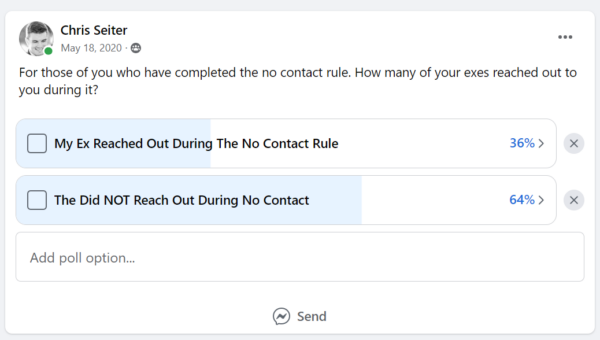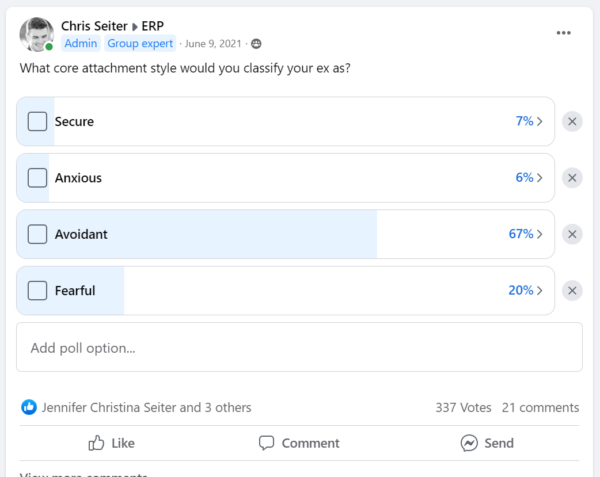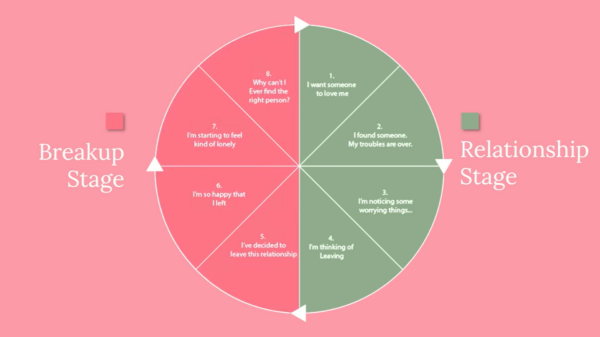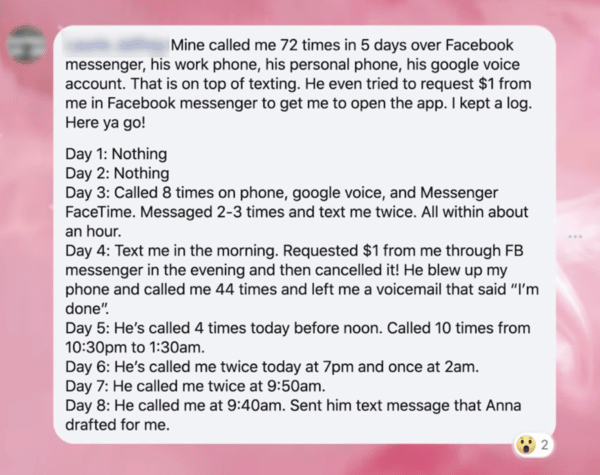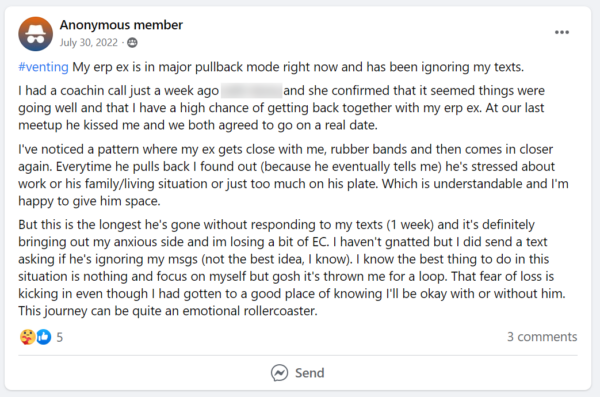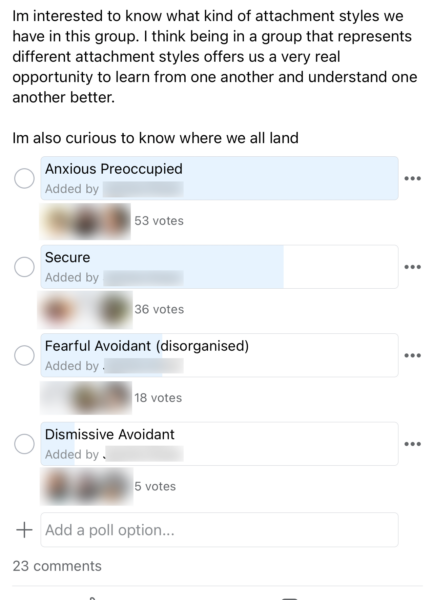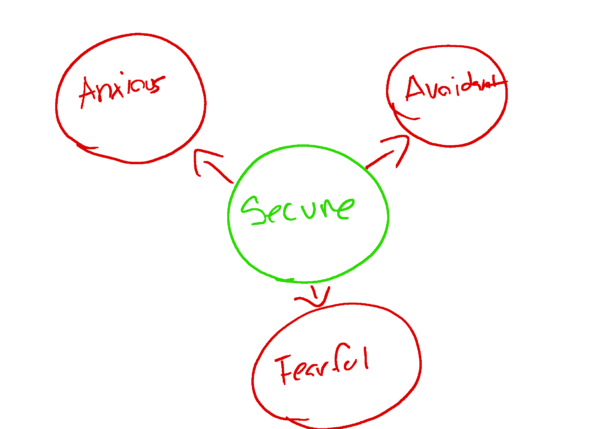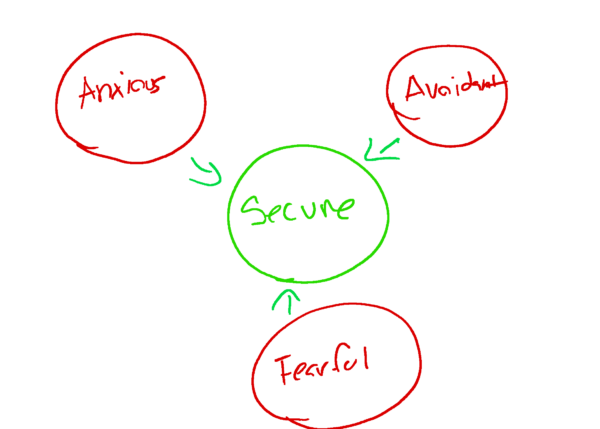This should go without saying, but perhaps the best way to understand what ignoring a dumper will do is to actually study what dumpers who are being ignored are actually doing.
Well, that’s what we’re going to be doing today.
For the past hour and a half I’ve been diving into our community and finding real stories of dumpers from our clients (the dumpee’s) to pinpoint exactly how they are going to act after a breakup.
Here’s what I’ve learned so far,
- Most exes don’t contact you at all (contrary to popular belief)
- Some might go crazy with reactance
- They will likely be a transitionary period where they hit a “tipping point”
- Sometimes they’ll rubber band
- Sometimes they’ll throw a tantrum
Let’s take a look at the actual stories though.

What Are Your Chances of Getting Your Ex Boyfriend Back?
Take the quizMost Dumpers Aren’t Going To Contact You At All
Let’s start first with perhaps one of the more crucial elements that many people seem to gloss over or don’t talk about.
And that’s the simple fact that most exes whom you ignore will not contact you.
You may have no idea what actions they’re taking, what they’re feeling inside and it’s going to seem as if they have no interest in you at all.
In fact, when we polled our clients and asked them, “Hey, for those of you who have completed a no-contact rule, how many of your exes have reached out to you during it?”
This was the response we got,
64% of the participants in this poll said that their exes did not reach out to them at all during the no-contact rule.
Now, why is this?
Well, we also have a strong belief that around 67% of the exes that we study in our program have avoidant tendencies.
You can see that evidence in this poll right here.
One of the things that I’ve always found particularly interesting about that number is how close it is to the no-contact rule poll number.
- So, on one hand, you have basically 67% of people saying that they believe their exes are avoidant.
- And on the other hand, you have 64% of exes actually not contacting our clients during a no-contact rule when they’re being ignored.
So if you actually understand anything about avoidant attachment style, you’ll understand that they go through a period of separation elation when they experience a breakup.
For someone with an avoidant attachment style, independence is the name of the game.
They want to regain their independence at all costs.
And so when they go through a breakup or initiate the breakup, for them, it is a reclaiming of their independence. They’ve finally gotten back the one thing they wanted more than anything throughout the relationship: that independence.
And they are going to go through an elated period where they are just basking in it.
I often call it the second honeymoon period.
You have the initial honeymoon period that happens at the onset of a relationship, but you also, for an avoidant, have a second honeymoon period that doesn’t last as long but can be just as addicting as regaining that independence.

What Are Your Chances of Getting Your Ex Boyfriend Back?
Take the quizBut what’s really interesting about the separation elation factor is that it doesn’t always last forever.
Just like a honeymoon period kind of fades away, the separation elation period, or the separation elation honeymoon period, will also fade and lead to depression, sadness, grief, and loneliness.
Oftentimes, avoidants will try to find things to do or people to distract themselves from feeling these emotions. I talk a lot about this in the avoidant death wheel.
You can actually see stages 7 and 8 of the avoidant death wheel really focusing on the sadness and depression of the breakup.
“Why is this always happening to me?” And then it paves the way for another revolution around the death wheel.
And around and around we go.
That is the most common behavior you can expect when ignoring an ex.
But you may be sitting there and thinking,
Ok… but why is ignoring an ex important then?
Well, it’s important because it’s usually during that grief-stricken time that you have the best opportunity to reconnect with them.
But remember that’s only 64% of our exes. There’s still a pretty large percentage of people, close to 40%—I think it’s actually around 36%, but let’s say 40%—that will react in all sorts of really interesting ways.
And this is where this article is going to get really fun. Because we’re going to be taking a look at all of the crazy behaviors that we’ve noticed over the years that exes will exhibit when they break up with you and you ignore them.
Behavior #1: Going Crazy With Reactance
When you ignore an ex, you create an environment where psychological reactance is likely to rear its ugly head.
Psychological reactance is a concept that essentially states that human beings are born with certain behavioral freedoms. But when you take those behavioral freedoms away, they become much more likely to do things to try to regain those freedoms.
So, in this particular case, if you are ignoring your ex, you’re taking away their behavioral freedom to talk to you.
When left to their own devices, sometimes they can do crazy things to try to get that behavioral freedom back.
And we have a lot of examples of this, like this one.
Example #1:
This is actually one of my personal favorite examples because it really shows how extreme exes can be.
So this particular person said,
“My ex called me 72 times in five days over Facebook Messenger, his work phone, his personal phone, and his Google Voice account. That is on top of texting. He even tried to request $1 from me in Facebook Messenger to get me to open the app. I kept a log. Here you go.
- Day one, nothing.
- Day two, nothing.
- Day three, he called me eight times on the phone, Google Voice, and Messenger, FaceTime. Messaged two to three times and texted me twice. All within about an hour. Day four, he texted me in the morning, requested $1 from me through Facebook Messenger in the evening, and then canceled it. He blew up my phone and called me 44 times and left a voicemail that said, ‘I’m done.’
- Day five, he’s called me four times today before noon. Called me 10 times from 10.30 p.m. to 1.30 a.m.
- Day six, he called me twice today at 7 p.m. and once at 2 a.m.
- Day seven, he called me twice at 9.50 a.m.
- Day eight, he called me at 9.40 a.m.”
The person then sent a text message that the ex-recovery coach drafted for her.

What Are Your Chances of Getting Your Ex Boyfriend Back?
Take the quizThis is perhaps the best example of reactance rearing its ugly head.
Our client took away the freedom of talking to her. She did a no-contact rule. She is ignoring her ex, and as a result, he is blowing up her phone not only, I think, to get the last word (which is kind of comical), but also I think it is his way of trying to at least keep that avenue of conversation open that he’s so afraid is potentially going away.
Example #2:
The second screenshot is quite fun.
This person said,
“My ex contacted me for the second time since no contact. It’s been less than a week. The first time was just a link to something via a chatting app. This time it’s a text on how to pronounce something. I feel terrible for ignoring it. Anyone else struggle with this?”
That’s the other difficult part of doing a no-contact rule.
You ignore your ex, and then they’re not always going to show reactance in a crazy way like the person I just referenced above. Sometimes they’ll be a little more subtle about it and try to ask for your help with something.
It can feel really difficult to ignore them, but it’s important to remember that ignoring them in an odd way will help them get through the separation elation period a little quicker, so that they enter stages seven and eight of that avoidant death wheel where they’re more likely to be open to conversation.
Example #3:
Another great example of reactance is,
“Am I supposed to keep ignoring my ex as he sends me friendly messages once a week into no contact?”
The answer to that is obviously yes.
So here we have many examples of exes who are basically falling victim to reactance.
They are trying everything they can to get the attention of their ex, and as a result, when they don’t get that attention, it digs them deeper into the hole. But what’s interesting about this is that this behavior doesn’t last forever.
There’s always a tipping point, and that’s the thing I’d like to talk about next.
Behavior #2: The Tipping Point
So what is a tipping point?
Well, imagine you are ignoring your ex, and it’s been maybe three weeks.
They’ve tried to text you; they’ve tried to trick you into conversing with them, and nothing. They’ve gotten nowhere.

What Are Your Chances of Getting Your Ex Boyfriend Back?
Take the quizAt that point, they may reach what I like to coin a “tipping point” where they decide, “Okay, this isn’t working anymore. I need to back off,” and you can see evidence of this in the screenshot provided.
This person said, “My ex completely ignores me now. They went from viewing my stories every day to now completely ignoring me.”
The tipping point is normal.
You know, you can’t stay in this reactant state forever.
What often comes after that is an overcorrection to the other side of the spectrum where they think, “You know what? I’m going to ignore them as well.” Some exes don’t do this, though. Some exes do a peculiar rubber banding thing.
Behavior #3: Rubber Banding
Take a look at this screenshot right here.
This person said,
“You know, my ERPX is in major pullback mode right now and has been ignoring my texts. I had a coaching call just a week ago, and it was confirmed that things seemed to be going well, and I had a high chance of getting back together with my ERPX. At our last meetup, he kissed me, and we both agreed to go on a real date. I’ve noticed a pattern where my ex gets close to me, rubber bands, and then comes in closer again. Every time he pulls back, I find out because he eventually tells me he’s stressed about work, his family living situation, or just too much on his plate, which is understandable, and I’m happy to give him space. But this is the longest he’s gone without responding to my texts—one week—and it’s definitely bringing out my anxious side, and I’m losing a bit of emotional control. I haven’t nagged, but I did send a text asking if he’s ignoring my messages. Not the best idea, I know. I know the best thing to do in this situation is nothing and focus on myself, but gosh, it’s thrown me for a loop. That fear of loss is kicking in even though I had gotten to a good place of knowing I’ll be okay with or without him. This journey can be quite an emotional roller coaster.”
All right, so this one is particularly interesting because this particular person is not ignoring their ex.
They already went through the initial ignoring the ex aspect.
They finished their no-contact rule out, and then they got back in contact with their ex, and things were going really well. But then the rubber banding occurs, and I think this is relevant to talk about even though this entire article is about ignoring an ex.
Eventually, especially if you’re trying to recover things with your ex, you’re not going to be in this state where you are ignoring them perpetually forever. You’ll be conversing with them, but we’ve even seen these rubber banding tactics occur.
When you get close or try to advance things up, they pull back. And I think a lot of this has to do with the avoidant side that many of the exes we study have. So remember, for avoidants, their core wound is a loss of independence.
And sometimes, if you’re progressing things a little too quickly, they’ll react to that in a very negative way by pulling back.
And since they aren’t in a relationship with you, they don’t feel there’s an obligation to necessarily include you in that decision. And so what you’ll see is they will start ignoring you for a little bit.
Again, this is not necessarily on topic for what we’re talking about today or in this particular article, but I do think it’s worth mentioning because it shows you that the ridiculous back-and-forth behavior that you’re experiencing now doesn’t necessarily stop when you get back in contact with them.
Behavior #4: Tantrum
Then, of course, we have another peculiar reaction, I suppose, to ignoring your ex, and that is the tantrum reaction.
The tantrum reaction is comically simple, as evidenced in this particular screenshot right here:
“Wow, I changed my profile picture to the super UG photo and he deleted me as a friend. I don’t know if he’s salty or what is going on, but it’s so unnecessary. Any insight?” So for reference, UG means “ungettable.”
One piece of advice that we tend to hand out to our clients is to be on point with their social media game. But sometimes, especially if you’re in this ignoring stage, when you start updating your social media profile, your ex throws a tantrum.
Albeit, this tantrum was a little quieter, but they’re doing things in direct reaction to your actions. This particular tantrum involved unfriending this very nice girl. The insight I have for this particular situation is that it’s all coming back to that reactance theory.
So especially if you have been ignoring your ex and they have tried directly to reach out to you, and you have continued to ignore them, and they see you doing well in life, the tantrum is, “Well, screw them. I’m getting them out of my life.”
And then they unfriend you or block you, which of course makes our clients very worried and upset that this is a permanent thing. Usually, it’s not. There are some cases where it can be, and I’m not going to lie about that, but typically it’s not.
Why I Still Think Ignoring A Dumper After A Breakup Is Ideal
So, despite all of that behavior – the crazy reactance behavior, the tipping point, the rubber banding aspect, the tantrums – I still recommend the no contact rule.
I still recommend ignoring your ex.
Why?
Well, if you look at the success stories that I’ve interviewed, each one of them raves about this period during no contact where they found themselves. Often, I’ll talk about this concept called “outgrowing your ex.”
But I think what’s really happening is you are getting to a place where you are recognizing your own worth, which might sound corny. Just take a look at this particular success story that I had the pleasure of interviewing last year. This is Thida.
Now, what’s interesting about Thida’s story is that not only did she get her ex-husband back, but every single ex she ever had came back.
She talks about all sorts of intriguing things in her success story interview:
- The important transition from being an anxious person to a secure person
- The importance of being on top of your social media game
- The advice on what really works to not just get one ex back but all of them. Again, that’s about finding yourself, outgrowing your ex. Sorry to spoil it.
- The importance of trinity work.
- The importance of having a battle buddy, something we discuss extensively in our community.
But the thing I’d like to emphasize is the transition from being an anxious person to a secure person. This relates to the secure attachment gravity concept I often discuss.
Alright, so we already know that most of the exes we study have dismissive avoidant attachment styles, while most of the clients I study believe they have anxious attachment styles – anxious preoccupied, to be specific.
Dismissive Ex:
Anxious Client:
A lot of the work that I try to do with people during the no contact rule is guiding them to a place where they can become more secure, less codependent on their ex.
And what I think Thida figured out is exactly that.
She became more secure in her time apart from her ex so that by the time she reconnected with her ex, it appeared to him as if he was talking to someone who had leveled up, someone different. All she did was become less anxious.
But really, the science behind this is the secure attachment gravity concept.
So I’ve always liked to liken attachment styles to something with gravity. Let’s discard the analogy that they’re like planets revolving around the sun; that’s a poor comparison. I prefer to use the analogy that attachment styles have a certain gravitational pull.
So when two people get into a relationship, there’s a battle that unfolds between their attachment styles.
Let’s say you have someone who is secure but enters a relationship with someone who’s dismissive avoidant. Well, a battle will unfold. Someone’s gravity will win out.
Either the dismissive avoidant will learn to become more secure over time, meaning that the secure attachment style’s gravity is winning out, or the secure person will become more anxious as a result of that dismissive avoidance, meaning the dismissive avoidant’s gravity is winning out.
So the key component to the no contact rule is for you to focus all your energies on outgrowing your ex and becoming a more secure and stable person after the breakup. Because what you’re considering is that when you’re done ignoring your ex, when the no contact is through, if you are secure, your attachment style can actually win out.
Slowly – and it’s a gradual process – but surely, they can learn through your relationship what it’s like to have a happy, healthy relationship.
